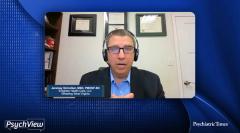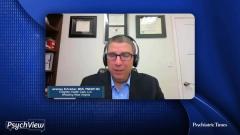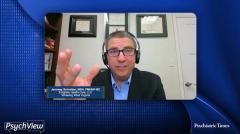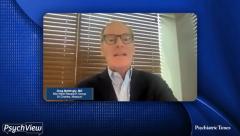
MDD as a Chronic Condition
Experts discuss how practitioners are viewing major depressive disorder (MDD) as a chronic condition vs an episodic condition.
Episodes in this series

Greg Mattingly, MD: This is a controversial topic but it’s a really interesting topic given where we are with some of the new treatments that have just been approved and are about to be approved. While we as practitioners may have a little bit of a hard time of thinking of depression as episodic, we even talked about this chronic relapsing prevention, let’s keep you from having your next episode model. What do you think when patients talk about episodic treatment? We’re going to treat you when you need it, more like an antibiotic and you don’t take treatment again unless you need it. We have several treatment options that are starting to be geared a little bit more that way. What do you think is the patient perception of chronic treatment versus episodic treatment?
Jeremy Schreiber, MSN, PMHNP-BC: I think the patient perception of that would be miraculous. I think patients would say, “Please, please let me do this.” I had a patient in my clinic today that was starting treatment with a more rapid acting agent. My colleague called me and said, “Jeremy, can you come talk to this patient?” One of the questions the patient asked me was, “Do I have to take this for the rest of my life? Is this something that I have to be on forever?” So when we think about depression being episodic versus being chronic and if we think that we may have treatments that are more like an antibiotic or a short course, I think patients are truly going to celebrate this because this is something that we don’t currently have for our treatments of major depressive disorder, or for a lot of the treatments of our mental health disorders with a lot of chronicity of our medication utilization. To have something that would be more short course I think will be celebrated. I’m not allowed to say things like game-changing because that’s too weird and too abstract. However, this short course would be something that would be unique and something that would be beneficial to patients. The other thing we look at [is] adherence rates of current treatments. We look at the medical diagnoses and adherence rates kind of fall down and then we step over in a psychiatry where adherence rates are very, very poor for psychiatric treatments. With adherence rates being poor, I also think having shorter course treatments is something that’s going to be good and potentially may improve adherence of those particular treatments. I know that when I get prescribed an antibiotic and they tell me to take it for 14 [days], I take it for all 14 days or 10 days or whatever the course is because I don’t want to build antibiotic resistance. If we have short course treatments for our patients, our patients will also be adherent to those courses.
Greg Mattingly, MD: Let’s just step back and think about some of the treatments that are available and some of the treatments that are coming. TMS [transcranial magnetic stimulation] would be 1 we could start to think about. So TMS used to be 1 treatment once a day that could take 30 days or so. We now have a new version of TMS that’s multiple treatments in the same day so that you’re done with treatments by the end of 5 days. When do you do TMS again? You do it if you need it again, but you don’t do it on a chronic basis. You do it only if depression should come back. If it was beneficial, you do it again. IV [intravenous] ketamine. How often do you do IV ketamine? Do you do it every day? No. You come in. You break your depression. You come back in, and you do it again if you need it again. Esketamine, we start out doing it twice a week, but then we space it out based on the patient’s needs, once a week, every 2 weeks. Some of my patients, every 3and a half weeks, we’llbring them back in for an esketamine treatment. Two of the other treatments that are in the same family would be Zuranoloneand a medicine called Brexanolone. Brexanolone is now currently approved is an IV infusion for 60 hours for a woman with postpartum depression. It breaks the postpartum depression, and you don’t take anything else unless you need something else down the road. Finally, there’s this group of neural steroids, Zuranolone being 1 that we’re looking at. You take it for2 weeks and you only take it again if you need it again. Many people over the course of a year may only need 1 2-week course or 2 2-week courses. Instead of a chronic treatment model, across these treatments we’re starting to say episodic as needed treatment where you get to be in control of when you need it.
Jeremy Schreiber, MSN, PMHNP-BC: It’s interesting that you talk about these upcoming medications as well. I talk to my patients, and I think to myself, “I know a medicine or something that might be coming down the pike from all the research I’ve read that I think would be very beneficial for you.” But it doesn’t exist in terms of availability yet. Some of these new medications, like the neuroactive steroids you talked about, have the potential to really have a significant positive impact on the patients we serve. Just going back for a second to the patient that was asking me about 1 of these rapid acting treatments for him, he asked, “How long do I have to take this or keep coming in to receive this treatment?” I said, “We get to here and then we tailor it for you specifically based on how often you need it. You might think that weekly’s good or you might think every couple weeks or you might not need to be on it and just come back in for another treatment at some point in the future. It’s not something that you would need to be on perpetually.”The patient really celebrated that it’s not something that they would have to take every day chronically.
Greg Mattingly, MD: It empowers patients.
TRANSCRIPT EDITED FOR CLARITY
Newsletter
Receive trusted psychiatric news, expert analysis, and clinical insights — subscribe today to support your practice and your patients.
















